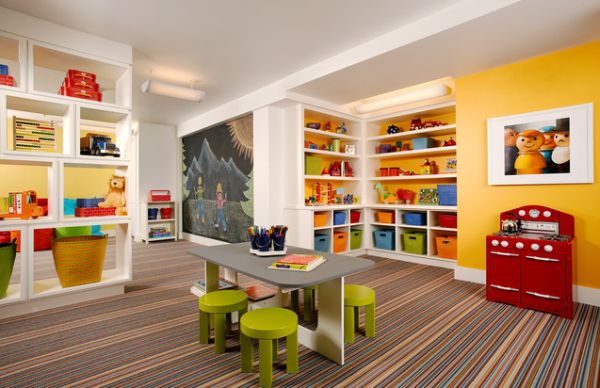Your shopping cart is empty!
CLOSE
Most families will benefit from having a playroom. If you have the space, they’re worth setting up. I’ve met some families that prefer to let the kids share a room, and use the other spare room as a playroom. It’s a great arrangement if your family is on bored – until the kids become a certain age, that is. If you’re unsure about whether you’d like a playroom, here’s why you need one.
1. Kids learn to share.
When you have multiple kids, they will inevitably receive toys for gifts. But as we know, kids will play with whatever they feel like, regardless of who it belongs to or archaic ideas of what’s “normal.” By storing all the toys in one room, kids learn to share their belongings with their siblings.
2. Playrooms encourage cooperative play.
When children play side-by-side, they’ll naturally play together. Their games will merge into a single storyline and they will naturally include one another. It’s actually quite lovely to see two kids of different ages interact fluidly simply because they were near one another.
3. Playrooms make for a tidier home.
By having a room dedicated to play, you keep all those play-things out of the rest of your house. Sure, the room might look like a disaster every day, but at least the mess is confined to a small area. Besides, kids play better when their toys are accessible. Surprise guests? Just close the door…
4. Playrooms make playdates easy.
When friends of your little guy or gal come over for a visit, a playroom is a convenient spot to plant them for the duration. Adults can remain in the living room or kitchen and have an actual conversation without being interrupted by screams and “Watch this, mommy!”
5. Playrooms leave bedrooms for sleeping.
When you perform a certain activity in a room often, a pattern is created in your brain. Bedrooms should be for sleeping so your mind naturally falls into that rhythm after some time in the room. If your child sleeps and plays in the same room, those modes in their brain will blend together. Let them play in the playroom and sleep in the bedroom so they do both of those activities well.
6. Playrooms are easier to organize.
When you keep all the toys, games, and art supplies in the same room, you actually make them easier to contain and organize. Keep all the board games in a neat stack on a shelf. Wrangle all the arts and crafts equipment into clear plastic boxes, neatly labeled with what’s inside. Keep the play cups, plates and spoons with the kitchen set. This way your kids will know where to go for their toys, rather than hunting around the house.
7. Play should be taken seriously (by adults).
During open-ended unstructured playtime, children practice verbal and nonverbal communication skills by negotiating roles and expressing their thoughts and opinions. In addition, pretend play helps children think out loud about their own experiences, which helps children to gain self-control of their emotions. Play is vital to healthy social development and a dedicated playroom is a great way to give your children these important life skills.
Guest Blog by Karri Bowen-Poole, Founder of Smart Playrooms
Smart Playrooms is owned and operated by teachers with many years of classroom experience and expertise. They bring the most effective classroom organization techniques and learning strategies into your home.
Smart Playrooms works to encourage kids to get back to the basics of play, using their creative side for art projects and imaginary play. Stressing that less is more, they help moms focus on the toys that will add to the experience. Some moms ask them to help organize their home, but Karri and Chris really like the idea of using their educational backgrounds to create custom designed playrooms. Plus, this gives them a niche in the market. Former teachers setting up your playroom – what could be better!

